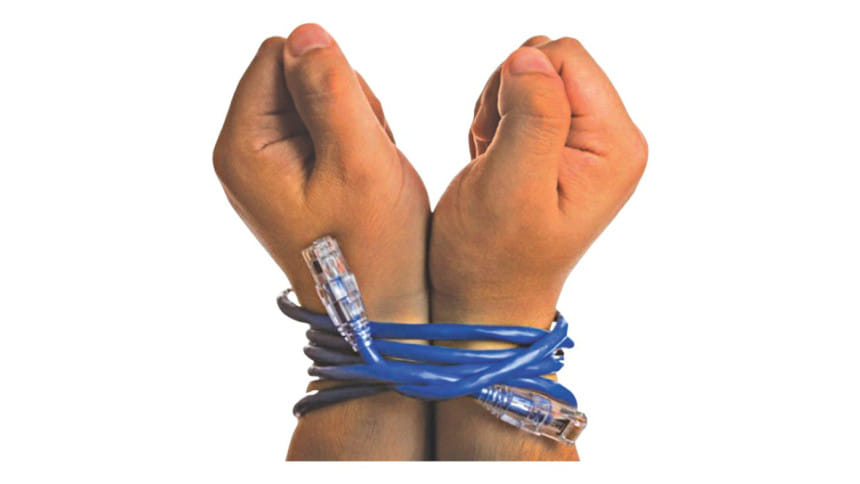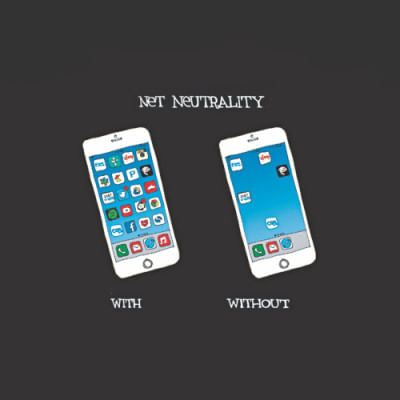FREE THE INTERNET

Suppose you and your family are going on a trip to a fine summer destination called internet resort. You enter the resort to find out that different rooms cost different amounts. But, there are 3 rooms which are free to use:
* Asroy.com Estore
* Ding Search Engine
* Macebook Social Media
Those are odd names for rooms! You think. Yet, you certainly do not want to pay for the room if you can get it for free. So you and your family vote to take one of the free rooms. Once you enter the room, however, you find out that the fan switch does not work. You have to pay extra for the fans to run. "That's unfair!" You say to the resort manager. He tells you that those are the rules and you can always switch to a room you have to pay for. You ask your family if they want to move to another room, but at that point you see that they have unpacked and would prefer to stay. Begrudgingly, you pay the extra money to use the fan facility. Then you go into the bathroom and find out the flush does not work, you have to pay extra for toilet paper as well. If this hypothetic scenario makes you furious, imagine what you would do if, let's say the internet becomes compartmentalised like that. Imagine the internet not being the free, egalitarian, and equalising public entity, but telecom companies providing privileges to certain websites by positive discrimination.

Before we get into the specifics, let's define what net neutrality is. Net neutrality is the idea that all content on the internet is equal, whether it be Keeping up with the Kardashian episodes or a link to that awkward photo from 7th grade. The concept holds that, all content on the internet be given equal ease of access without discrimination. This means that YouTube cannot bribe your internet provider to get its users more internet speed than Vimeo. The internet service provider cannot favour or block particular content of the internet and has to treat all services, apps, and websites equally.
Net Neutrality keeps the underdog on the same level as a multinational conglomerate. Net neutrality lets your fashion website be in the same league as GQ or Vogue, in terms of accessibility. It lets your startup app compete on the same level as Facebook, Instagram, or Whatsapp. On the internet, you have the opportunity to be heard as loudly as anyone else, as long as net neutrality stands.

YOU WANT NET NEUTRALITY.
Through the use of a clever strategy called 'zero rating', Internet.org has marketed itself as a benevolent entity that brings 'free internet' to poor people who cannot afford to use the Dhaka dweller's luxury service that is, the internet. It is an app that allows users to access certain websites and services without having to pay for data. This marketing strategy is completely misleading because even though it seems to provide this service from the goodness of heart, the money for the service is paid by the websites and apps that get to benefit from reaching so many new users. Here are the problems with positive discriminations towards major websites such as Facebook through Internet.org:
* It makes it seem like these websites are what the necessary parts of the internet are. It makes Facebook seem like THE social media platform, whereas a person may prefer Google+. Just the name is complacent enough, Internet.org. The users must decide what is relevant on the internet, not the telecom company. This discrimination creates a 'walled garden' where only certain websites reach people and they become the platform for what those users think of as the internet.
* It privileges some websites over others. Remember a time when most people used Hi5 as their go to social media website? What if Internet.org was active then? All new users would have used Hi5.com because it was free, even if an innovative new idea, such as Facebook, had been introduced to the internet, we would have still preferred Hi5 as our primary social media experience because the internet provider privileged Hi5 over Facebook. Ironically enough, without net neutrality, Facebook could have never become the giant that it is now.

In the words of Arnav Goswami, in the context of India where net neutrality has been a hot-button topic this year, "We hand immense power to telcos and online service operators. In effect, they can become gatekeepers, able to pick out winners and losers in a market and favour their own sites, services, and platforms over others."
The consumer who will use free Facebook will be accustomed to it being free, and it will pay that extra money for services that Internet.org does not provide, such as video uploading. This means that Facebook, through its 'free' business model, will make the money back indirectly from the consumer. Therefore, when you choose the free rooms with your family in the internet resort, you will be paying that extra fan service fee, and toilet paper fee, just because you are used to this room, and you prefer the convenience.
Due to discrimination of convenience by Internet.org, certain major news outlets have an unfair advantage in reaching more people than their competitors. This monopolises the market and reduces free market competition. Suppose that this website had a particular bias. They will reach more people through this 'free' internet, and they can spread any agenda that they may have over large numbers of people. Moreover, they have a significant advantage over news sources that do not pay the telecom to become a free service through Internet.org.

Major online shops receive unfair benefits because they paid to have the opportunity to become 'free'. Therefore, if you wanted to start an online business, and did not have the money to become a 'free' website on Internet.org, you are at a direct disadvantage.
The processes explained above are already under way. Net neutrality is under attack because of corporate lobbying. It goes back to the old adage: If it's too good to be true, it usually is. The consumer is the commodity.
Countries such as Canada, the Netherlands, Chile, and Slovenia have restricted Internet.org because they see the benefits of having the internet remain a free and standardising entity.
On the flip side, Mark Zuckerberg posted on Facebook that he believes that net neutrality and zero rating are not opposed to each other, and that both can exist together. Yet, with zero rating, the telecom companies decide what websites get privilege. It is true that it does not provide these websites with a faster lane, but it provides free access, which might be even worse for net neutrality.
Free the internet. Not through clever gimmicks that corporate giants use to earn revenue, but free the internet by upholding net neutrality.
Ref:
Tanmay Bhat of 'AIB' on Net Neutrality Debate - The Newshour Debate: Fight for free internet. https://www.youtube.com/watch?v=6IAqN3_waBA
"Facebook's March to Global Domination Is Trampling over Net Neutrality." The Verge.
"Open Letter to Mark Zuckerberg: Internet.org vs. Net Neutrality, Privacy and Security." Edri.org.

 For all latest news, follow The Daily Star's Google News channel.
For all latest news, follow The Daily Star's Google News channel. 



Comments